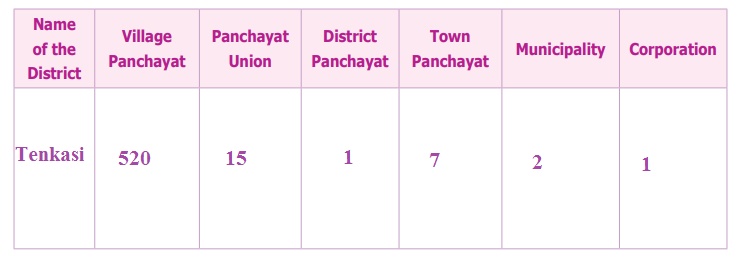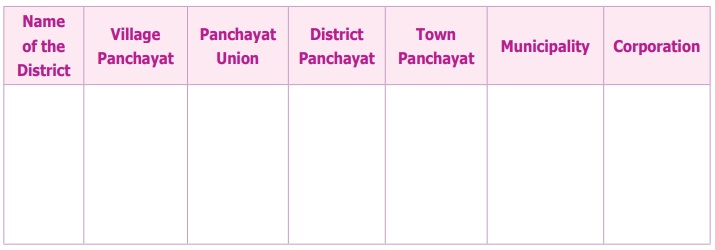Local Bodies - Rural and Urban | Term 3 Unit 2 | Civics | 6th Social Science - Exercises Questions with Answers | 6th Social Science : Civics : Term 3 Unit 2 : Local Bodies - Rural and Urban
Chapter: 6th Social Science : Civics : Term 3 Unit 2 : Local Bodies - Rural and Urban
Exercises Questions with Answers
Exercises
I. Choose the correct answer.
1. ________ is set up with several village panchayats
a. Panchayat
Union
b. District
Panchayat
c. Taluk
d. Revenue
village
Answer: (a) Panchayat Union
2. _________ is National Panchayat Raj Day.
a. January 24
b. July 24
c. November 24
d. April 24
Answer: (d) April 24
3. The oldest urban local body in India is
__________.
a. Delhi
b. Chennai
c. Kolkata
d. Mumbai
Answer: (b) Chennai
4. District has the highest number of Panchayat
Unions.
a. Vellore
b. Thiruvallore
c. Villupuram
d. Kanchipuram
Answer: (c) Villupuram
5. The head of a corporation is called a
__________.
a. Mayor
b. Commissioner
c. Chair
Person
d. President
Answer: (a) Mayor
II. Fill in the blanks.
1. Tamilnadu is the first state in India to introduce town
Panchayat.
2. The
Panchayat Raj Act was enacted in the year 1992.
3. The tenure
of the local body representative is 5 years.
4. Walajahpet is the first municipality in Tamil Nadu.
III. Match
1. Grama Sabha
- Executive Officer
2. Panchayat
Union - State Election Commission
3. Town
Panchayat - Block Development Officer
4. Local body
election - Permanent Unit
Answer :
1. Grama Sabha -
Permanent Unit
2. Panchayat Union
- Block Development Officer
3. Town Panchayat -
Executive Officer
4. Local body
election - State Election Commission
IV. Answer the following.
1. Is there any corporation in your district?
Name it.
Yes, Madurai Corporation.
2. What is the need for local bodies?
Local bodies are structures to
fulfil the needs of people.
3. What are the divisions of a rural local
body?
Panchayat, Panchayat Union and
District Panchayat are rural local bodies.
4. What are the divisions of a Urban local
body?
Town Panchayat, Municipality
and Corporation are urban local bodies.
5. Who are the representatives elected in a
Village Panchayat?
1. Panchayat President
2. Ward members
3. Councillor
4. District Panchayat
Ward Councillor
6. List out a few functions of corporations.
❖ Drinking
water supply
❖ Maintenance
of Clean Environment
❖ Primary
Health Facilities
❖ Space for
markets
❖ Solid waste
management
❖ Parks
❖ Birth and
Death registration, etc.
❖ Street Lighting
❖ Laying of Roads
❖ Building flyovers
❖ Drainage System
❖ Corporation schools
❖ Playgrounds
7. List out a few means of revenue of village
Panchayats.
❖ House tax
❖
Professional tax
❖ Tax on
shops
❖ Water
charges
❖ Specific
fees for property tax
❖ Specific
fees for transfer of immovable property
❖ Funds from
Central and State Governments, etc.
8. When are Grama Sabha meetings convened? What
are the special on those days?
1. January 26 - Republic Day
2. May l - Labourer’s Day
3. August 15 - Independence Day
4. October 2 - Gandhi Jeyanthi
9. What are the special features of Panchayat
Raj system?
❖ Grama Sabha
❖
Reservations
❖ Three tier
local body governance
❖ Panchayat
Elections
❖ Tenure
❖ Finance
Commission
❖ Account and
Audit, etc
10. What is the importance of Grama Sabha?
A Grama Sabha is formed in every Village Panchayat. It is the
only permanent unit in the Panchayat Raj System. Grama Sabha meetings are held
even in smaller villages. The Grama Sabha is the grass root level democratic
institution in a Village Panchayat.
Those who have attained the age of 18 years and whose names are
found in the electoral roll of the same Panchayat can take part in a Grama
Sabha meeting. The Grama Sabha meetings are conducted four times a year.
Officers like the District Collector, the Block Development Officer, teachers
etc., also participate in this meeting. The people can freely express their
needs and grievances.
V. HOTs
1. Local bodies play an important role in the
development of villages and cities. How?
The services provided can be divided as obligatory functions and
discretionary functions. These are provided by the local bodies.
Functions of the
village Panchayat Obligatory Functions
❖ Water supply
❖ Cleaning roads
❖ Laying down roads
❖ Street
lighting
❖ Drainage
& sewage pipes system
❖ Activation
of Central and State Government schemes
Discretionary
Functions
❖ parks
❖ Libraries
❖ Playgrounds,
etc.
Functions of the
City Municipal Corporation
❖ Drinking
water supply
❖ Street
Lighting
❖ Primary
Health Facilities
❖ Laying of
Roads
❖ Building
flyovers
❖ Space for
markets
❖ Drainage
System
❖ Corporation
schools
❖ Playgrounds
❖ Maintenance
of Clean Environment
❖ Solid waste
management
❖ Parks
❖ Birth and
Death registration, etc.

VI. Activities
1. Prepare a questionaire to interview a local
body representative.
2. Discuss; If there is a contribution to the
improvement of your school by local body representatives
3. If I were a local body representative, I
would.....
4. Find out the number of local bodies in your
district and list them.

Related Topics